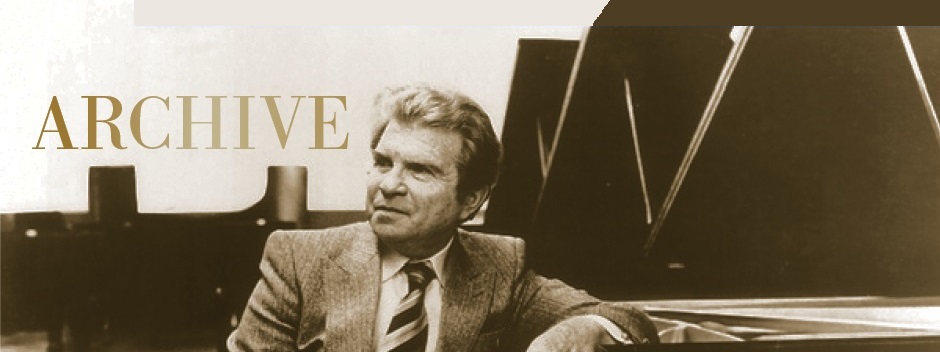Gilels graduated from the Odessa Conservatory in the autumn of 1935. Subsequently, he was accepted into the class of Heinrich Neuhaus as a postgraduate student at the Moscow Conservatory, and Gilels renewed his commitment to giving concerts. The outset of Gilels’ career was turbulent and it did not help that his relationship with Neuhaus was a strained one. Neuhaus refused to acknowledge the fact that Gilels, already a laureate of an important competition, was a famous musician in his own right. Neuhaus had no qualms in sardonically pointing out Gilels’ minor faults, and indeed felt that this was necessary if only to make sure that the young pianist did not become conceited and complacent. However, Gilels’ nature was such that he was exceptionally modest, shy and self-critical: in fact, far from the fear of complacency, Gilels was in need of encouragement in his Artistic searching and sensitive, heartfelt guidance.
Despite the wider ramifications of his competition-acclaim, Neuhaus continued to see Gilels’ achievements first and foremost as a virtuoso who was in dire need of working unceasingly at his musicality and general understanding of music. The heroic passion of Gilels’ pianism was somewhat at odds to Neuhaus’ westernized cultural refinement: Neuhaus dismissed the clarity and simplicity of Gilels’ interpretations as the manifestations of his ignorance and failed to see that in fact these qualities had their roots in the very same simplicity that is attained in later life by all but a select few. Notwithstanding this, Gilels then and in future gained much from his association with Neuhaus although their relationship never gained the cordial understanding that Gilels hoped for.
For Gilels the difficulty in this period of his life was not that he was searching aimlessly for ‘inner-content.’ He knew that this existed in his pianism. Instead the complexity of Gilels’ development at this time lay in the fact that this was a transitory phase: the time when a differentiation forms between a youthful performance that relies on musical intuition and a mature musician who replaces this blind intuition with a thorough understanding of his musical accomplishments. This phase is passed through by most great musicians, but for Gilels, whose musical intuition was nothing short of genius and captured such a complete spectre of feelings and styles, this journey was especially hard. In order for this perceptive intuition to materialize into the consciousness it required a lot of hard work which, in the absence of Neuhaus’ understanding, and excluding some requests for help from Konstantin Igumnov and Samuil Feinberg, Gilels had to undertake alone.
Also hard at this time were the living conditions for Gilels. Before the government gave him a flat in Moscow, Gilels had to rent a room to live in. Within the conservatory Gilels was isolated and found only a few friends such as Yakov Flier and Yakov Zak. In the conservatory the trend was to play in an ‘interesting’ manner and to ‘think-up’ something new – a trait that Gilels felt was a manifestation of bad taste. He was not understood and his interpretation was condescendingly considered ‘simplistic.’
On the surface however, things seemed to be going well. Gilels’ brilliant virtuosity was acquiring strength, his mastery was gaining a great degree of polish, and his repertoire was increasing. His interpretations of Chopin’s Sonata No. 2 in B flat minor Opus 35 and Ballade No. 1 in G minor Opus 23, Tchaikovsky’s Piano Concerto No. 1 in B flat minor Opus 23, Liszt’s Piano Concerto No. 1 in E flat S. 124 and Spanish Rhapsody S. 254 and Schumann’s Toccata Opus 7 became events in themselves. The public adored Gilels in defiance to the fact that the critics continued to educate him. The ordinary listeners felt what many important musicians already knew, and what a substantial number of professional musicians failed to comprehend – the noble simplicity and profundity of Gilels’ Art.
The unbelievable phenomenon, ‘Gilels’, found its recognition from the outside. Upon arriving to Moscow at the start on 1936, the great conductor Otto Klemperer performed Beethoven’s Piano Concerto No. 3 in C minor Opus 37 with none other than Gilels as the soloist. In the wake of this performance some members of the conservatory found it ‘a first-year student performance.’ Yet writing later, Neuhaus reported that it was an ‘outstanding performance’ in which he ascertained structural integrity, truth and simplicity.
In 1936 Gilels participated in his first international competition – the International Vienna Music Academy Competition. Despite attracting the attention of Europe and the unquestionable prestige of being a finalist, Gilels looked upon the second place awarded to him as a failure. First place was awarded to his friend Yakov Flier – an intensely Romantic pianist.


